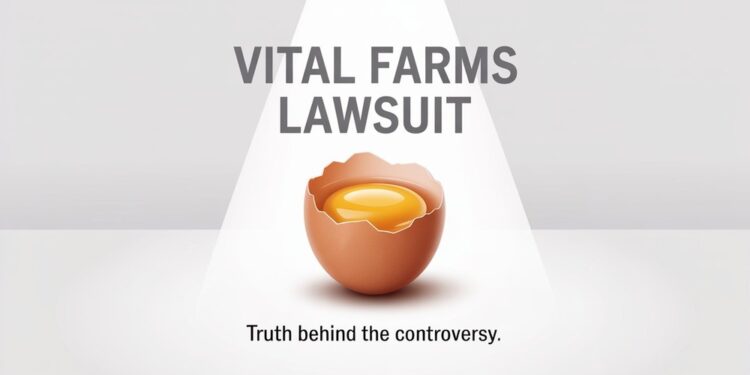Introduction
Vital Farms, a company renowned for its mission to provide ethically sourced, pasture-raised eggs and dairy products, has long been recognized for its commitment to sustainable and humane farming practices. Founded on principles of transparency, animal welfare, and environmental stewardship, the brand quickly became a favorite among consumers who are ethically conscious. However, beneath the glossy marketing lies a complex legal battle that questions the very foundation of these claims. The “Vital Farms lawsuit” has sparked controversy, fueled debates over ethical labeling, and garnered national media attention, creating ripples throughout the food industry.
Timeline of the Vital Farms Lawsuit
The Vital Farms lawsuit officially began in May 2021, when a class-action lawsuit, supported by the PETA Foundation, was filed against the company. The plaintiffs alleged that Vital Farms misled consumers through deceptive marketing, suggesting that their eggs came from chickens living in idyllic, cruelty-free conditions. The timeline spans several years of legal developments, including a critical moment in March 2022 when a federal judge refused to dismiss the case, suggesting the claims had sufficient merit to proceed.
As the case unfolded, Vital Farms faced intense scrutiny not only from animal welfare groups but also from watchdog organizations and skeptical consumers. By May 2023, PETA had withdrawn from the case, and in early 2025, the class-action claims were dismissed entirely. The court ruled in favor of Vital Farms, stating there was insufficient evidence to prove deliberate consumer deception, effectively closing the lawsuit without any settlements or payments.
Allegations Against Vital Farms
At the heart of the lawsuit were allegations that Vital Farms engaged in “humane washing” — a term used to describe companies that falsely advertise their products as ethically produced. According to the plaintiffs, terms such as “pasture-raised” and “humanely treated” were used to create a misleading impression that hens had free access to spacious, green pastures and lived cruelty-free lives.
In reality, the lawsuit alleged that many of these hens were subjected to standard industry practices, including beak trimming (also known as debeaking) and confinement for extended periods, particularly in inclement weather conditions. Furthermore, the practice of chick culling (the killing of male chicks) was cited as another example of cruelty inconsistent with the brand’s image. The plaintiffs argued that third-party certifications, such as “Certified Humane,” failed to meet consumer expectations for ethical treatment, thereby misleading customers into paying premium prices for products that did not meet the advertised standards.
PETA’s Role and Withdrawal
The lawsuit gained further attention due to the involvement of the PETA Foundation, which provided legal backing and investigative support. PETA alleged that Vital Farms used clever marketing and picturesque imagery to sell consumers a story of animal welfare that was inconsistent with behind-the-scenes practices. However, the legal relationship between Vital Farms and PETA quickly deteriorated when the company subpoenaed documents from PETA.
This legal conflict resulted in a surprising twist: PETA was sanctioned by the court and eventually ordered to pay over $290,000 to Vital Farms in 2023. As a result of these complications, PETA withdrew from the case in May 2023, diminishing the momentum of the class action. Their exit marked a turning point, weakening the plaintiffs’ position and ultimately contributing to the case’s dismissal.
Court’s Perspective and Rulings
The court’s initial decision to allow the case to proceed in 2022 was seen as a landmark moment in consumer protection law, particularly regarding humane washing and greenwashing. The judge ruled that the plaintiffs had plausible claims, even if the products carried third-party certifications. This highlighted a growing trend in the judiciary to consider consumer perception over industry standards when it comes to advertising practices.
Despite this early win for the plaintiffs, the case ultimately failed to meet the burden of proof required for damages. In January 2025, the court dismissed the case, stating that Vital Farms had not violated any specific legal standards and that the marketing materials, although perhaps idealistic, did not constitute fraud. The ruling underscored the challenge of litigating ethical claims in a system that primarily evaluates legal definitions rather than moral interpretations.
Vital Farms’ Response Strategy
Throughout the lawsuit, Vital Farms remained proactive in defending its brand. The company issued public statements on its website and engaged directly with consumers through blog posts and social media. In a blog post updated in early 2025, Vital Farms detailed the legal timeline, clarified the allegations, and emphasized the court’s final ruling as a complete exoneration.
To further bolster transparency, Vital Farms launched several initiatives aimed at rebuilding consumer trust. These included live-streaming footage from partner farms, releasing educational content on their animal welfare standards, and engaging with customers through TikTok and other platforms. Their communication strategy revolved around transparency, education, and reaffirming the company’s commitment to ethical sourcing.
Consumer Trust and Social Media Reaction
Social media played a pivotal role in shaping public perception of the Vital Farms lawsuit. Viral TikTok videos and Reddit discussions questioned the authenticity of the company’s claims, with some users accusing the brand of exploiting consumer trust. Critics shared images, stories, and investigations that appeared to contradict Vital Farms’ marketing.
However, not all consumers turned away. A significant number of supporters defended the brand, citing its comparative transparency and willingness to improve. They pointed out that, despite its flaws, Vital Farms offered a better alternative to factory-farmed eggs. The divide in public opinion reflects a broader consumer dilemma: how to reconcile ethical values with the limited options available in the current food system.
Industry Impact and Legal Precedents
The Vital Farms lawsuit established a significant precedent for food marketing litigation. It demonstrated that consumers are increasingly willing to challenge brands in court over ethical inconsistencies. Terms like “humane,” “pasture-raised,” and “natural” are now under the microscope, as companies realize that vague or aspirational language can become a legal liability.
More broadly, the lawsuit has prompted calls for stricter labeling regulations and more rigorous third-party certifications. It also encouraged consumer advocacy groups to advocate for more precise definitions of what constitutes ethical food production. Other companies are taking note, reassessing their own marketing and sourcing practices to avoid similar legal entanglements.
What Consumers Should Know
For consumers, the Vital Farms lawsuit serves as a reminder to scrutinize marketing claims more closely and look beyond slogans to examine sourcing practices. Certifications like “Certified Humane” or “Pasture-Raised” often come with nuanced definitions that don’t always match consumer expectations. Understanding what these labels truly mean is crucial for making informed purchasing decisions.
Consumers should also be wary of red flags in branding, such as overly idyllic imagery or vague language about animal welfare. Researching brands, reading third-party reports, and supporting truly transparent companies can help ensure that consumer dollars support ethical practices. The lawsuit highlights the importance of consumer vigilance in a marketplace where ethics and marketing often overlap.
Conclusion
The Vital Farms lawsuit may have ended in the company’s favor, but it sparked a critical discussion around ethical marketing and humane farming claims. It brought attention to the limitations of current labeling standards and the growing demand for corporate accountability. While Vital Farms successfully defended itself in court, the controversy highlighted the gap between consumer expectations and industry practices.
As consumers continue to prioritize ethics in their purchasing decisions, brands must evolve to meet those expectations with honesty and integrity. The legacy of the “vital farms lawsuit” will likely influence not only legal interpretations but also how companies communicate their values to the public. Ultimately, this case serves as both a cautionary tale and a catalyst for change in the food industry.
Do Read: Armor Correctional Health Services Lawsuit – Timeline, Impact & Ongoing Cases

















